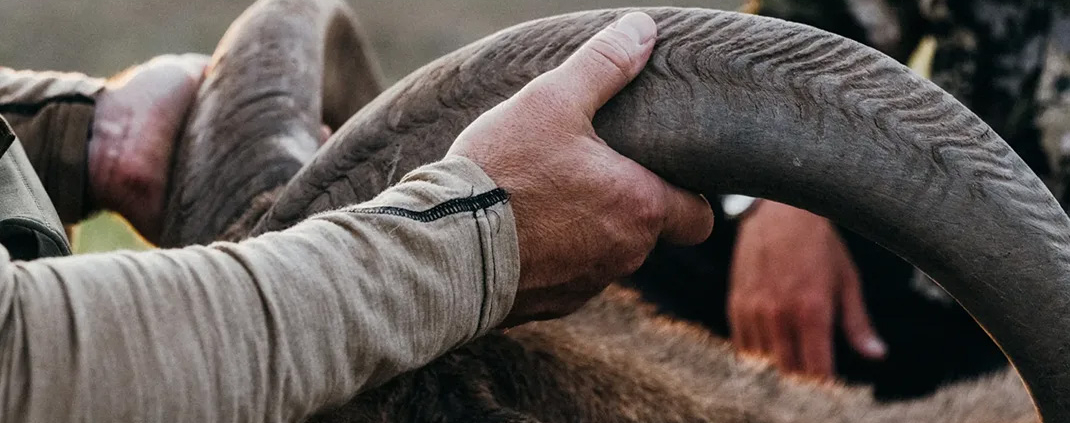Aoudad Hunting in West Texas: A Thriving Industry With Economic Benefits
West Texas, best known for its rugged landscapes and rich biodiversity throughout Big Bend National Park, has quietly become a hunting hotspot. Several big-game animals call this rugged place home, including mule deer, bighorn sheep, elk, javelinas, and pronghorn. But perhaps the most iconic species in these parts is the aoudad or Barbary sheep. Sporting an impressive pair of horns and enticing ambitious hunters with a steep, adrenaline-filled challenge, aoudad are a staple of West Texas culture. And, they’re a necessary element of the region’s economy.

Texas presents nonresident hunters with an unfamiliar obstacle. It’s big enough to be its own country, and 93 percent of the state’s land is in private hands. Aoudad are a curious product of this enigma, as they’re almost entirely hunted on private lands via landowner tags. However, with the largest free-range population of aoudad in the United States, West Texas has become a major tourist destination and local communities have embraced hunting and its economic benefits. Adding to our Connecting the Dots Series, Robbie Kroger makes his rounds through West Texas to learn about the importance of hunting — both culturally and economically — in this rural oasis.
Aoudad: An Exotic Addition to Texas Wildlife
Aoudad were first introduced to Texas in 1957 as exotic game animals. With little predation and ample space to roam, the population has grown, particularly in the Trans-Pecos region. These are particularly big animals, too, often weighing more than 300 pounds, with a stunning appearance. But beyond a certain trophy appeal, they surely have, aoudad are exempt from the constraints of hunting seasons or bag limits. Not only does this loophole turn West Texas into a prime, year-round destination for both resident and nonresident hunters, but it also fuels the economic engines of rural towns throughout the region.
Guiding Services and Outfitters

One of the most significant economic contributors within the aoudad hunting sector is the proliferation of guiding services and outfitters. These businesses provide expertise, gear, and access to private land, where most aoudads are hunted. In West Texas, ranchers have found a new revenue stream by partnering with outfitters or directly offering hunting leases to tourists.
An aoudad hunt can range from $3,000 to $6,000 or more, depending on the length and scope of the excursion. This influx of revenue doesn’t just benefit the ranchers but also creates jobs for guides, trackers, and other support staff. Small towns like Alpine, Marfa, and Fort Davis, which may otherwise have minimal economic activity, see an increase in demand for food, lodging, and transportation during peak hunting seasons.
Economic Spillover Into Local Businesses

The ripple effect of the aoudad hunting industry is felt throughout West Texas. Lodging businesses, particularly hunting lodges and motels, experience a steady flow of clientele, while local restaurants, gas stations, and equipment stores enjoy increased sales. For a region with relatively few industries, these dollars are critical.
“It’s very beneficial for the town,” said Presidio restaurant owner Hector Armendariz. “Y’all will be hunting out in the desert and don’t have time to come down and sit down. Maybe you’ll get a decent meal where you sit down at a restaurant once a day or every other day. So then you pack up lunch and go to the grocery store. That means a lot to us. Y’all come in here and y’all are just doing your thing, but it’s flourishing for us. We love y’all down here.”
In fact, hunting tourism supports a variety of secondary industries. Vehicle rentals and maintenance shops see a boost, as the rough terrain often requires off-road vehicles. Specialized sporting goods stores selling rifles, scopes, and camouflage clothing also benefit. Even taxidermists find steady work, as hunters often wish to preserve their trophies, further circulating money within the local economy.

The economic benefits of aoudad hunting extend to land management practices, too. Ranchers who struggle with cattle ranching due to drought conditions or fluctuating beef prices have increasingly turned to wildlife management. Hunting leases offer a more predictable and sometimes more profitable income. By diversifying their operations, ranchers can improve their financial stability, often using the funds to improve land infrastructure.
“At the end of the day, this is something gorgeous out here, but it’s still a business,” said ranch owner Wendy Roderick. “We have to make money or it doesn’t go any further. [Hunting] is a very important part of the pie — I mean, it’s the sweets. The cattle take care of the day-to-day stuff, but hunting is the pot of gold at the end of the rainbow.”



